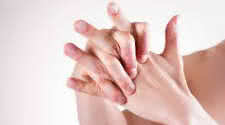Cracking Joints and Fitness

Advanced Exercise & Health Sciences
White it feels good to relieve pressure by cracking your back, neck or knuckles, many people worry that it can cause problems down the line. Consequently, you'll be relieved to learn that relieving pressure is all it does. If you do it properly, cracking your joints doesn't
predispose you to problems of arthritis or cause you to have enlarged knuckles. The popping sound you hear results from the release of a small amount of gas as the bones are moved apart. Slight shifts in body or joint alignment may well relax pressure and relieve stress in the
region.
Slammed Fingertips. How many times have you slid a weight onto a bar or machine and caught your fingers between two plates? Or dropped a plate or dumbbell on your toes by mistake? While the latter occurrence may not be all that common, the former happens more often than you might
realize. The question is, When it happens to you, what can you do to relieve the pain and at the same time save the nail? The best remedy appears to be to squeeze your finger and nail for up to five minutes to reduce the swelling and internal bleeding that damage the nail root.
The pressure will also help reduce the pain. After five minutes or so apply ice for an additional 10 minutes. Unless the damage is severe, this procedure should help relieve the pain and, more important to most people, save the nail.
Exercise and Immunity
Research has shown that exercise in moderation enhances your immune system. Overtraining, on the other hand, has been shown to lower immunity, making you more susceptible to colds or infection. When it comes to the time you put in on your job, the opposite may be true, a factor that, like overtraining, involves the issue of stress. Being a workaholic is no longer considered to be stressful if you enjoy your work, while feeling powerless or insecure in a job environment is more stressful than the total amount of time spent at work. In fact, studies have shown that the people who put in the longest hours were generally the most satisfied with their jobs and enjoyed them the most.Recent studies have also found that mental stress, or emotional distress, can have a negative effect on your immune system. Part of this appears to be due to physiological changes in blood platelets in response to psychological stress. We need further research on the exact mechanisms and the effects that they have on blood clotting and an increased risk of heart disease.
In any event, moderate training may benefit your health not only by improving your immunity directly but also by reducing your emotional stress, So keep on lifting.